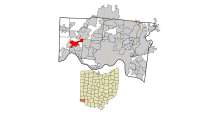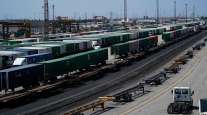Bloomberg News
Railroad, Union Labor Fight Moves Toward Biden Intervention

[Stay on top of transportation news: Get TTNews in your inbox.]
Major railroads, including Union Pacific Corp. and BNSF Railway Co., and their unions remain at an impasse after a government board ended efforts to mediate a settlement, a move that will likely force President Joe Biden’s administration to intervene and prevent a strike that could cripple an already-strained U.S. supply chain.
The National Mediation Board sought to move the negotiation into binding arbitration, but the union has rejected that offer, the National Carriers’ Conference Committee said in a statement on its website. The talks will now enter a 30-day cooling-off period and then a presidential emergency board appointed by the White House to resolve the dispute.
“The railroads would consider accepting the proffer, but the union leadership has already indicated that it will not,” said the committee, which also represents CSX Corp., Norfolk Southern Corp. and Kansas City Southern, which is being acquired by Canadian Pacific Railway Ltd. “The railroads expect a PEB will be appointed in this dispute before the end of the 30-day cooling-off period, as has been the case in prior unresolved national rail negotiations,” it said in the statement.
A rail strike would severely constrict the supply of goods across the country, which is still recovering from bottlenecks caused by the pandemic. If the presidential board can’t resolve the issues, then Congress would have to step in. If federal legislators fail, then the union could call a strike or the railroads could hold a lockout.
The White House did not immediately comment.
Talks Since 2020
The talks, which involve about 115,000 union rail workers and more than 30 railroads, began in January 2020. The unions have said the two sides are far apart on issues such as work rules and benefits, and complained their workers are stuck under the contract frozen since 2019.
“Our members are the essential workers who keep the supply chain moving safely every day,” said Dennis Pierce, national president of the Brotherhood of Locomotive Engineers and Trainmen, one of the unions participating in the talks. “Despite record profit by the Class I railroads, our people have failed to get an extra dime in contract raises during the pandemic and struggled to get any time off.”

How can trucking companies persuade new drivers to stay? Host Mike Freeze brings in onboarding expert Anthony Pellegrino of Ag Energy Transport. Tune in above or by going to RoadSigns.TTNews.com.
The unions said they rejected arbitration because their rank-and-file membership can’t vote on any binding solution resulting from such a process. With a presidential board, union members can vote to approve or turn down a proposed deal.
One sticking point in the negotiations involves worker health care plans. The unions say the railroads are seeking to increase out-of-pocket expenses that would effectively negate any pay increase the companies are offering. Another issue is the railroads’ efforts to reduce crew sizes from two people to one and have conductor work done by an employee on the ground who can service multiple trains.
On average, union rail workers make $130,000 a year including benefits, according to the railroads.
The railroads “look forward to demonstrating to the expected Presidential Emergency Board how the railroads’ proposals appropriately reward rail employees’ hard work and skills while best positioning the industry to grow and compete for traffic in the nation’s highly competitive freight marketplace,” the industry committee said in its statement.
With assistance from Jordan Fabian.
Want more news? Listen to today's daily briefing below or go here for more info:




